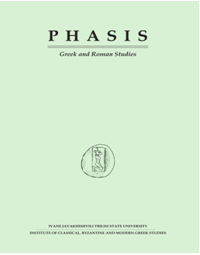On Cretan-South Caucasian Toponymic Parallels
DOI:
https://doi.org/10.60131/phasis.17.2014.2321Abstract
The Pre-Greek linguistic world demonstrates a clear unity and one of the best examples of this unity are geographic names of the Island of Crete, which have numerous parallels in the entire Aegean region – on islands, as well as in Continental Greece and Anatolia. This issue is substantially accentuated by R. Brown in his well-known book Evidence for Pre-Greek Speech on Crete from Greek Alphabetic Sources (Amsterdam 1985). He successively reviews the names presented at different places of the Island of Crete and divides the island into four parts: western, western-central, eastern-central and eastern. Mediterranea-Kartvelica by R. Gordeziani was published in three volumes 2007-2008. It dedicates too much place not only to the parallels which are abundantly shown at the level of appellatives but also in geographic names. R. Gordeziani found parallels with the South Caucasian languages for too many toponyms presented by Brown. If we consider the fact that majority of reviewed names cover the area of Crete-Anatolia-South Caucasus, we can say that this is mainly the area from where South Caucasian tribes must have come from the Caucasus to the Aegean region, in the opinion of R. Gordeziani and E. Furnee. In this case, one circumstance draws our attention: the names for which parallels are found cover nearly entire Crete which means that if this is the result of migration, it must have been essential and it is not excluded that creation of geographic names is related to this migration Another circumstance is interesting: which regions of the Caucasus connection is observed with? In fact, geographic names which show parallels are not accumulated in one region and cover the entire South Caucasus which makes us think that this was not the result of movement of a small group of emigrants only. It is significant that Cretan-Kartvelian parallels demonstrate a systemic nature in the aspect interesting for us. This suggests that existence of these parallels is caused not by borrowing a separate geographic name only, but it must have been created from within the Pre-Greek language.Downloads
Published
2014-05-17
Issue
Section
Articles
License
Copyright (c) 2014 PHASIS

This work is licensed under a Creative Commons Attribution-NonCommercial 4.0 International License.


